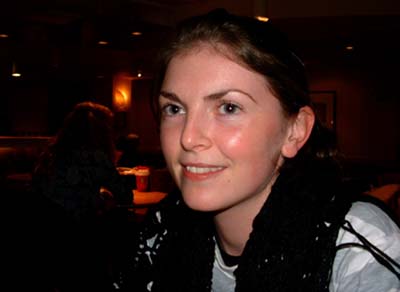Career interview: Film marketing analyst
Francesca Harris knows what she wants from her career - and has known since school - but she was not always sure how to get there. However, a combination of good careers advice and careful subject choices at school and university has helped her to keep her goals firmly in sight.

Francesca always knew she wanted to work in either the music or film industries, although at the business end rather than as a performer. Her school career guidance counsellor couldn't really offer her any specific advice, but did suggest she keep up with her core subjects and stay as general as possible in her choices. "I was advised to keep on my core subjects, like English and maths, because they're a great foundation for a career. And for getting into university or going on to another training course, they play a vital role. When you go into any job, an awful lot of what you have to do you have to learn on the job, so it's good to have those core skills to build on. A subject like maths helps you to develop your thought processes, to solve problems and work things out logically, which is what most employers are looking for, after all. And if you don't have good maths and English skills, well, other candidates will."
Basics, basics, basics
With this advice in mind, Francesca decided to go for a very general course at university and took "Business, Economics and Social Studies" at Trinity College Dublin. As it turned out, one of the core courses was maths. There were also some fairly general courses on marketing, but with hindsight she now realises they were not that useful and truly believes that, for a career like hers, it's better to concentrate on the basics at university and then learn the more specific details of a job once you have the job. As she points out: "if I have really good basic qualifications, then most likely they'll train me on the job, and I'll be able to learn quickly."

20 photocopies a week
Francesca graduated in 2001 after a four year course. For most of the other people on the course, the future was fairly well planned out and most of the law firms and investment banks had come in to give presentations and to try and recruit for their various graduate programmes. "But I didn't want to be an investment banker, so in my fourth year I photocopied my CV about 20 times a week and sent it out to all the film studios and record labels. I did that for about 4 or 5 months until it was time for my finals.
"I'd had no feedback except for rejection letters, and lots of people telling me: "We'll keep your CV on file". Well, it's been on file ever since and I've never heard from any of them! But I did get a call from Universal Music a couple of weeks before my finals. They did a telephone interview and offered me a job, but it wasn't due to start for another few months. The job was a marketing assistant internship for a year - really bad money, particularly compared with all the people I'd been at university with who all started off on amazing salaries - but I guess it was a sacrifice I always knew I'd have to make for a few years."
Thinking that if it all went wrong she could always go into banking, Francesca decided to accept the job and give marketing a go. However, she had a few months to fill before the internship started, and so she decided to work for 2 months to earn the money to go out and visit her boyfriend, a professional cricketer, who was playing out in Australia over the winter. "I got on the internet, typed in Perth, music, film, and the dates I would be out there, and found out that the Perth International Film Festival would be on around then. I emailed the festival managers and said: 'look, I'm over in Perth, I'll work for free, if you need help let me know.' And they did."
In demand
"I did 2 or 3 half-days a week, helping out with things like mailing lists, or being at events to show guests in. I was there for 2 months and did that most of the time I was there. When you're looking for a job or waiting to start a job you've got to keep yourself active. It's a perception thing; people think you're in demand - it's particularly important in media."
Early in 2002 Francesca started with Universal Music, working in a team that included the vice-president of Universal Music. The work was all to do with providing promotional material such as CDs and t-shirts and coordinating the schedules for promotional tours, television interviews and advertising. One important aspect was keeping a record of the material that was being released and when, and whether it was on CD or cassette.
"You have to know how many units you're selling in the entire world, so we were coordinating all the figures and pulling them together to get general numbers. There was a lot of Excel use. Let's say, for example, that I was taking orders for Eminem t-shirts. Everyone would email in their orders, I would tally up what they had to owe and pay, and then send the orders off to the distribution warehouse. If you get that wrong you have to be issuing credit notes and it becomes a big problem.
"It wasn't so glamorous, but I was trying to pick up on what the marketing managers were doing and trying to work out what a marketing plan is. Whenever a new territory releases an album, they have to make a series of financial estimates as to how many units they'll sell over a certain amount of time while the album is being promoted and how much revenue they're going to generate for the company. At the end of the day it's a business and it's all about generating revenue and keeping revenue high."
Picture perfect

just waiting to be marketed
At the end of a year, after the internship finished, Francesca stayed in marketing, taking up a job offer at Universal Pictures. Whereas the internship had looked at the international markets, her new job was concerned only with the UK market and she found herself dealing with the specifics of, for example, the number of units of a DVD or video that different outlets might order and why the size of their orders might vary from time to time.
She is also responsible for planning advertising campaigns to coincide with new releases and so it is important that she knows her product, and her target audience, perfectly. "It's vital I know who the consumer is and the media they consume. Say, for example, that the film is an adult drama. In that case I know to advertise it on Channel 4 in the evenings, around the time they're showing their property programmes."
Francesca had to go to an interview for the job at Universal Pictures, and one of the first things that was picked up was that she had a degree in economics. "I was a bit taken aback because numbers were important at Music but not as important as they seemed to be making out in the interview. But because I did maths I'm not afraid of an Excel spreadsheet, so I thought I'd be fine. When I got into the job I realised that if you're releasing a film, there's so much analysis to do before you release it: much more than for a CD.
"With film there are more defined genres and they don't go in and out of fashion in the same way music does. With music it's more what the mood is. Now guitar bands are really in, two years ago it was all rap. But with film, you have a drama, or comedy, or whatever.
"When you're releasing a film, you can estimate how many DVDs you're going to sell by looking at comparisons with other films that are very similar. You look at sales in week 1, week 2 and so on, and the pricing. The analysis gets to such a stage that when I get the figures through for the sales on day 1, I can usually work out through all my spreadsheets how many it's going to sell all-time. If it has a big day 1, it'll go on to be a big all-time number. There's an awful lot of analysis mixed in with the marketing."
100% sure

how many?
Day to day, Francesca doesn't use a lot of complex maths in her work. However, she does rely heavily on her numeracy and ability to process numerical information quickly and efficiently and, as she points out, these things have become second nature to her only because she has the confidence which comes from studying and understanding maths to a higher level than she needs. "I got to a level where I was comfortable with algebra and probability, which I don't use, but it gave me confidence with the more basic things. And everything in maths gives you more of an understanding of what came before. I basically spend all my time working on spreadsheets, and I have to work out a percentage of a percentage of a final number, which is only a proportion of the overall spend, and I have to be fast. I have to feel confident that when I have a number and somebody says: 'Are you sure that's right?' I can say: "Yes, I'm 100% sure.'"
But even though the job requires little in the way of complex maths, Francesca points out that she definitely couldn't have got it without having a degree. "The job ad specified at least a degree, but really it's almost like you need a Masters now to get anywhere - my job experience helped me to get around that. I got a 2.1 in my degree, and because it had maths and economics and statistics that gave me the edge."

experience is everything
In fact, practical experience is something Francesca has a lot of and she has worked hard all along to get it. In a profession where experience counts for more than qualifications, she believes it is vital to be proactive and to be constantly looking for opportunities rather than waiting for them to come to you. While still at school, she did some work experience with an advertising agency, because it was vaguely media-related, and also assisted a photographer who was working on the Eurovision Song Contest.
She also worked during the summer holidays while at college - first with a film production company out in Los Angeles and then at a radio station back in Ireland - and also offered to help out wherever she felt she could gain any valuable experience. "I contacted a film school and said that if they needed a hand with anything on set, or if they were shooting a student short, to get in touch with me. They did, and I helped out with a few films. Work experience is great - you're not going to get paid for any of it but it gives you a chance to find out what you want to do and I think if you know what you want to do you've much more chance of getting there."
From marketing to production

As far as the future is concerned, Francesca also has a good idea of where she wants her career to take her, and that is on from marketing and into film production. "The idea would be to hook up with a young, exciting director and help them to produce their first work. It's the producer's job to arrange the finance, to hire a production manager, divide out the budget, work out what you can afford to do, who to hire, get a location manager to work out where you shoot your film.
"But after your film is in the can it's not over, because you have to work with a distributor to release it, either in the cinema or on DVD. You go through all of the deals, even as far as TV rights. You shop it around film festivals. You're trying to sew up as many deals as possible to make back as much as possible on your original investment. The producer is always the last one to be paid, so you need to know how much is being spent all along, and work out all the financing deals. Hopefully at the end the profit and loss account will look good."
But until this happens Francesca is happy where she is, and the perks are pretty good too. "We get to see screenings months before films are released, and quite often get tickets to premieres. I managed to get tickets to various things at the London Film Festival, including "The Man Who Sued God". I absolutely love Billy Connolly and at the premiere he was meant to do a short introduction, but actually ended up doing a really funny 20 minute mini-show. That was great.
"You also get to meet a lot of really interesting people like directors and producers, and go to Q&A sessions. And I worked on a film with Eddie Izzard and Joanna Lumley, and when we were recording the actors' commentaries for the DVD I went down to hear them recording it. And I never have to buy my own DVDs and CDs. I have friends in low places!"
About this article
Helen Joyce is editor of Plus. She interviewed Francesca Harris in London.
Additional reporting by Andrew Stickland.